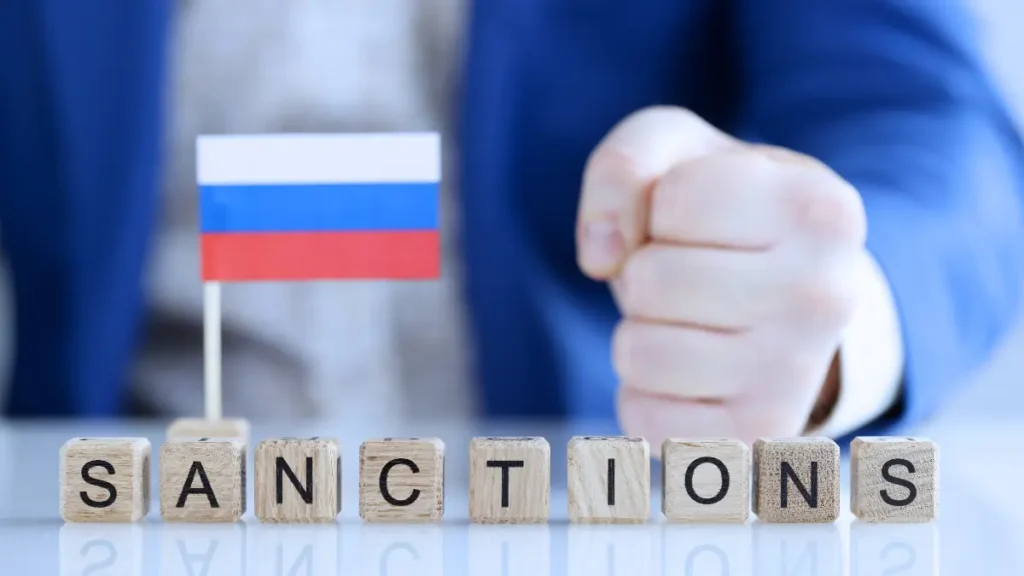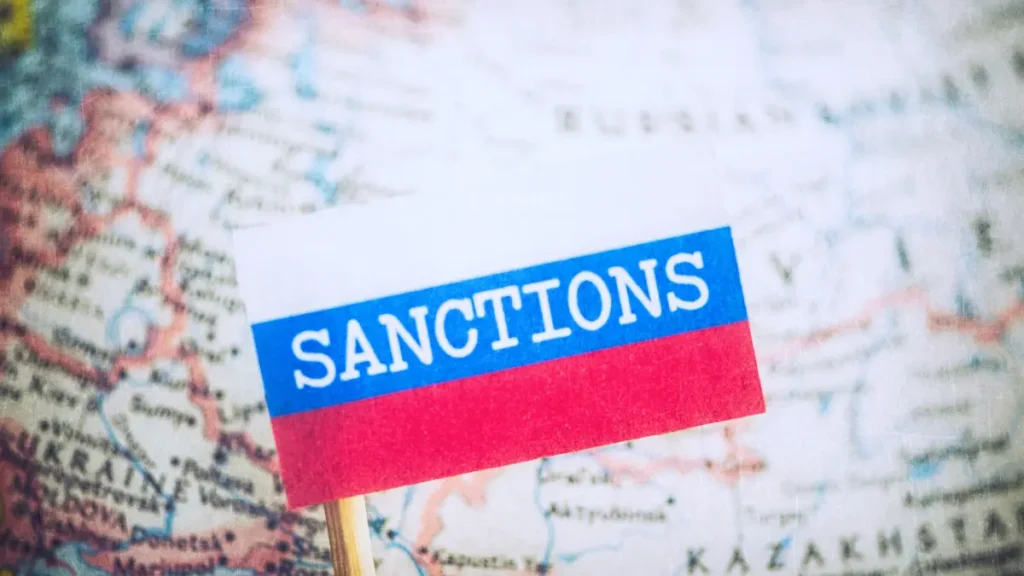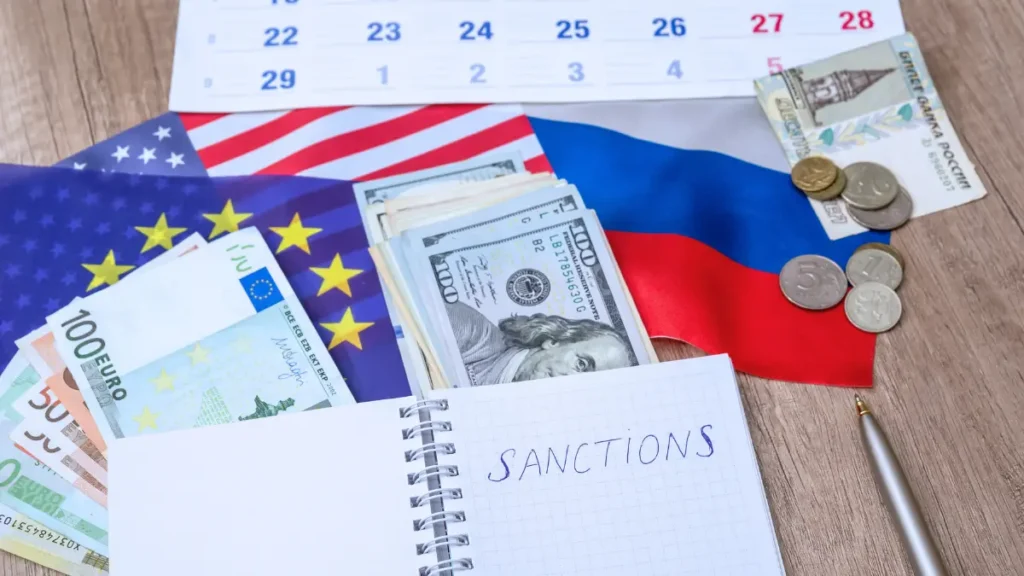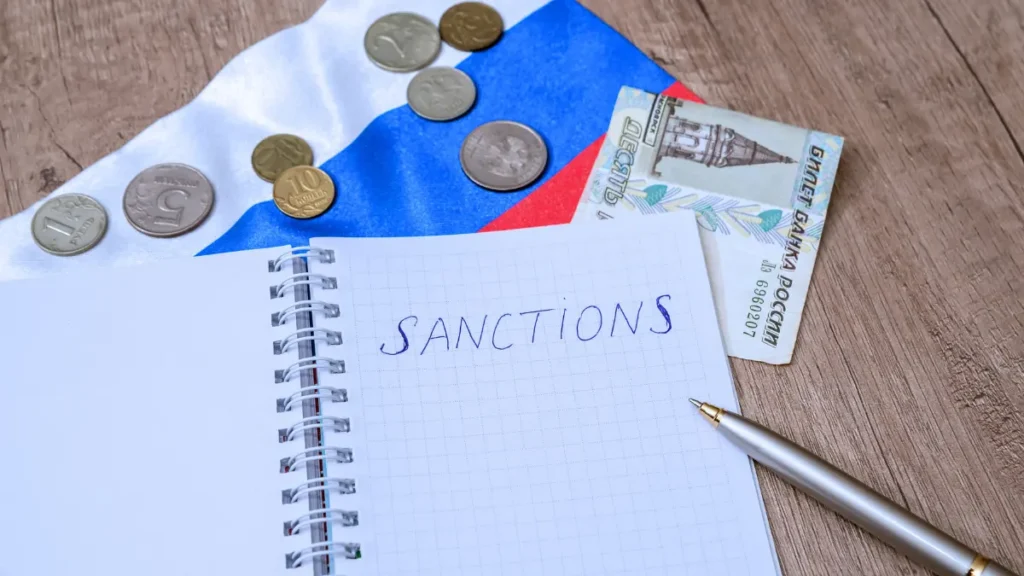Details of Russia Sanctions: You’ve likely been hearing a lot about Russia sanctions lately. With tensions high as Russia continues its unjust invasion of Ukraine, many countries have imposed various sanctions against Russia, its leaders, and certain industries. Trying to keep track of all the details around who has sanctioned what can quickly get confusing. That’s where this comprehensive guide comes in. Over the next few sections, we’ll break down exactly what sanctions have been levied, by which countries and organizations, as well as what impacts they aim to have.
We’ll also discuss how Russia has responded to these measures. Whether you just want a quick overview or are looking to really dive in, this guide has you covered. So read on for the full details around the many Russia sanctions that are now in place.
Overview of Russia Sanctions

The United States, European Union, and United Kingdom have imposed several rounds of sanctions on Russia in response to its annexation of Crimea in 2014 and its backing of pro-Russian separatists in eastern Ukraine. These sanctions have targeted Russia’s energy, banking, and defense sectors to deter further Russian aggression.
Restricting Russian Energy
The EU and U.S. have imposed sanctions restricting the export of oil and gas technology to Russia and limiting cooperation with Russian energy companies like Rosneft and Gazprom. The sanctions have made it difficult for these companies to access financing and technology from Western companies. They have also banned certain Russian energy projects like the Nord Stream 2 gas pipeline.
Targeting Russian Banks and Finance
Western sanctions have cut major Russian banks like Sberbank, VTB Bank, and Gazprombank off from U.S. and European capital markets. The sanctions freeze these banks’ assets and ban most transactions with them. The sanctions have also targeted Russian oligarchs and officials close to President Putin by freezing their overseas assets and restricting their travel.
Limiting Russia’s Defense Industry
Sanctions have banned exports of military and dual-use technologies to Russia and blacklisted major Russian defense companies like Almaz-Antey and Tactical Missiles Corporation. The sanctions have made it much harder for Russia to access components and financing for its defense industry, limiting its weapons development.
The comprehensive sanctions regime has significantly weakened Russia’s economy by reducing access to global financial markets and technology. However, Russia has found ways to mitigate some of the sanctions’ impact, and relations with the West remain tense. The future of sanctions on Russia remains uncertain.
Key Sanctions Imposed by the United States
The U.S. has imposed several rounds of sanctions on Russia for its invasion of Ukraine and other harmful activities. In 2014, the U.S. issued sanctions against individuals and entities responsible for the crisis in Ukraine. The sanctions targeted Russian government officials, separatists in eastern Ukraine, and Russian businesses.
Restrictions on U.S. Debt and Equity Markets
In the same year, the U.S. banned certain Russian banks and energy companies from accessing U.S. debt and equity markets. The sanctions prohibit U.S. persons from transacting in, providing financing for, or dealing in new debt of longer than 30 days maturity or new equity for these Russian entities.
Sectoral Sanctions
In 2017, the U.S. imposed “sectoral sanctions” targeting Russia’s energy, financial, and defense sectors. These sanctions restrict the provision of goods, services, and technology for new deepwater, Arctic offshore, or shale oil exploration projects in Russia. They also prohibit U.S. persons from transacting in or providing financing for new debt of longer than 14 days maturity for entities subject to sectoral sanctions.
The U.S. has also sanctioned numerous Russian oligarchs, officials, and entities for election interference, cyber attacks, human rights abuses, and Russia’s occupation of Crimea. In 2021, the Biden administration imposed sanctions on Russian officials over the poisoning of opposition leader Alexei Navalny. The U.S. continues to call on Russia to end its “malign behavior” and has warned of consequences should Russia invade Ukraine again.
While these sanctions have weakened Russia’s economy, Russia remains determined to advance its interests, often through covert means. The future of U.S.-Russia relations depends on whether Russia changes course, but more sanctions may be inevitable if it continues its provocative behavior.
European Union Sanctions on Russia
The European Union has imposed numerous sanctions on Russia in response to its actions in Ukraine. The EU first introduced sanctions in 2014 following Russia’s annexation of Crimea and its role in the conflict in eastern Ukraine. The EU sanctions on Russia mainly target the Russian economy, limiting access to EU capital markets, restricting exports of oil production technology, and banning arms sales.
The EU has progressively strengthened its sanctions on Russia in response to breaches of ceasefires and the lack of implementation of the Minsk agreements. The EU sanctions now apply to Russian individuals and entities involved in undermining or threatening Ukraine’s territorial integrity, sovereignty, and independence. They include travel bans, asset freezes, and economic sanctions on Russian banks, oil companies, and the defense sector.
The EU’s sanctions on Russia are designed to increase pressure on President Putin to change course in Ukraine, while limiting damage to EU economies. However, the sanctions have negatively impacted EU-Russia trade and the Russian economy. The sanctions ban new investment in Russia’s oil industry, limit exports of military and dual-use goods, and restrict Russian access to EU capital markets.
The EU has linked lifting sanctions to Russia’s full implementation of the Minsk agreements and restoration of Ukraine’s control over its border. However, there is little sign of progress on either front. The EU is likely to roll over sanctions again in December 2020, though there are growing calls from some EU member states to ease sanctions to revive economic ties with Russia. The future of EU sanctions on Russia remains uncertain, dependent on geopolitical events and Russia’s actions.
UK Sanctions Against Russia
The UK has imposed sanctions against Russia in response to Russia’s actions in Ukraine. In 2014, the UK sanctioned Russia following its annexation of Crimea and support for pro-Russian separatists in eastern Ukraine. The UK targeted Russian and pro-Russian Ukrainian officials and separatist leaders, as well as limited sectors of the Russian economy like finance, energy and defense.
In the years since, the UK has expanded sanctions in coordination with the EU and US. In 2018, the UK sanctioned Russian military intelligence officials implicated in the Salisbury nerve agent attack. The UK has also sanctioned Russian officials and oligarchs for human rights abuses, like the businessmen Yevgeny Prigozhin and Alexander Bastrykin.
In 2021, as fears grew over Russian troops massing on Ukraine’s border, the UK prepared sanctions against Russian banks, the aviation sector and wealthy individuals. The UK vowed to block Russian companies from raising capital in UK markets and limit trade with occupied Crimea. The UK warned Russia that further aggression against Ukraine would lead to “severe costs”.
The UK’s Russia sanctions currently prohibit making funds and economic resources available to listed Russian individuals and entities. Sanctioned Russian banks cannot raise loans or float shares on UK markets. The UK has banned exports of military and dual-use goods and technology to Russia for use in Crimea. The UK also cannot import goods or technology from Crimea.
The UK’s sanctions aim to raise the cost of Russia’s actions while minimizing damage to British businesses and the economy. But sanctions have strained UK-Russia political and economic ties. Russia considers the sanctions illegal and has retaliated by banning some British imports. Still, the UK maintains that sanctions will remain until Russia changes course on Ukraine and human rights. For now, the future of UK-Russia relations remains uncertain.
Impact of Sanctions on the Russian Economy

The sanctions imposed by the United States and European Union on Russia following its annexation of Crimea and intervention in eastern Ukraine in 2014 have dealt a major blow to the Russian economy. Russia’s economy has struggled since the sanctions were put in place, facing slow growth, currency devaluation, and rising inflation.
The sanctions targeted Russia’s energy, financial, and defense sectors, limiting Russia’s access to Western capital and technology. The sanctions cut off major Russian banks and companies from Western financing and banned the export of certain technologies to Russia. This made it difficult for Russian companies to obtain funding and access critical components and equipment.
The sanctions, combined with a drop in global oil prices, caused Russia’s economy to fall into a recession in 2015. Russia’s GDP contracted by 2.3% and inflation spiked to 12.9%. The Russian ruble lost over half its value against the U.S. dollar. Living standards declined and poverty rose sharply.
To counter the impact of sanctions, Russia has tried to boost economic ties with China and other non-Western countries. But China cannot fully replace Europe as a trading partner and source of investment. Russia’s economy remains heavily dependent on exports of oil and natural gas to Europe.
The sanctions have failed to force Russia to change its policies in Ukraine, but they have significantly weakened Russia’s economy. Lifting the sanctions would provide relief to Russia’s struggling economy. However, the sanctions are unlikely to be lifted as long as Russia maintains control over Crimea and continues to destabilize eastern Ukraine.
The sanctions regime has proven effective at constraining Russia’s ambitions, demonstrating that Western powers can work together to counter Russia when its actions violate international norms. At the same time, the sanctions have shown the interdependence of the Russian and Western economies. While damaging to Russia, the sanctions have also hurt European companies and economies. Managing this interdependence while confronting Russia’s disruptive behavior remains a key challenge.
Russian Individuals and Entities Targeted
The U.S. and EU have imposed sanctions on numerous individuals and groups within Russia as punishment for its actions in Ukraine. These targeted sanctions aim to put pressure on those responsible for Russia’s aggression and destabilization of Ukraine.
Russian Government Officials
The U.S. and EU have sanctioned high-ranking Russian government officials, including members of President Putin’s inner circle. These sanctions typically involve asset freezes and travel bans. The sanctions are meant to isolate these officials and undermine their authority.
Russian Oligarchs
Western nations have also targeted Russian oligarchs, wealthy businessmen with close ties to President Putin. Sanctions on oligarchs are intended to put pressure on Putin by weakening some of his key allies and financial supporters. The sanctions have made it difficult for oligarchs to access their wealth and assets in Western countries.
State-Owned Companies
Sanctions have also been placed on major Russian state-owned companies, especially in the energy and financial sectors. These sanctions limit the ability of companies to access Western financing and technology. They are meant to weaken key parts of the Russian economy and government. The sanctions on state-owned companies have had a significant impact, contributing to economic turmoil in Russia.
Private Military Companies
Western nations have sanctioned Russian private military companies (PMCs) like the Wagner Group, which are closely linked to the Russian government. The sanctions are aimed at curbing the influence of these PMCs, which have fought on behalf of Russia in places like Syria, Ukraine, and various African countries. The sanctions make it illegal for anyone in the U.S. or EU to do business with these groups.
The web of sanctions on individuals, oligarchs, state-owned companies, and private groups highlight the West’s strategy to broadly weaken Russia through economic and diplomatic pressure. Although controversial, these sanctions remain an important foreign policy tool for confronting Russian aggression.
Restrictions on Trade With Russia
The U.S. and EU have placed major restrictions on trade with Russia in response to its actions in Ukraine. These sanctions severely limit Russia’s access to Western technology and finance. Let’s explore the details of these trade restrictions and their impact.
Russia’s economy depends heavily on exporting oil and natural gas, especially to Europe. However, EU sanctions ban the import of Russian oil into Europe, Russia’s largest customer. The EU has also restricted sales of technology and services for Russian oil exploration. These sanctions have dealt a major blow to the Russian economy, which shrank in 2015 for the first time in six years.
The U.S. and EU have also targeted Russian banks and companies with sanctions. Major Russian banks like Sberbank and VTB Bank are cut off from Western finance and capital markets. U.S. sanctions also prevent Western companies from doing business with Russian companies in the defense and energy sectors. These measures have made it much harder for Russian companies to borrow money and grow their businesses.
In response, Russia has banned many Western imports like food products in an attempt to hit back at the West. However, Russia’s economy depends much more heavily on trade with the West than vice versa. Russia’s countersanctions have hurt some European farmers but caused relatively little damage. Russia’s hopes that the West would drop sanctions have so far proven futile.
The future of Western sanctions on Russia depends on whether Russia changes its behavior in Ukraine. If Russia were to withdraw forces from eastern Ukraine and support the Minsk peace agreement, the West would likely ease or drop sanctions. However, as long as Russia continues to destabilize Ukraine, sanctions are likely to remain in place. While painful for Russia’s economy, sanctions seem to have had little impact on Russia’s actions so far. More severe measures may be needed to truly deter Russia’s behavior.
Evading Sanctions on Russia
You may be curious about how Russia continues to operate despite heavy sanctions. The truth is, Russia has become adept at evading restrictions through crafty techniques. President Putin and his allies have exploited loopholes and developed workarounds to undermine the sanctions regime.
One common tactic is using shell companies and intermediaries to obfuscate ownership and mask Russian involvement in transactions. The U.S. and EU have cracked down by banning dealings with certain Russian banks and energy companies. However, the Kremlin establishes new front companies to continue business as usual.
Russia also turns to alternative financial systems outside Western control. For example, Russia developed its own payment processing system, Mir, as an alternative to Visa and Mastercard. They have also increased trade with China and other allies not participating in sanctions. The BRICS bloc of emerging economies has discussed establishing its own rating agency and bank to rival Western institutions.
Moreover, oligarchs and government officials frequently take advantage of tax havens and secretive banking jurisdictions to stash their assets beyond the reach of regulators. Panama Papers leaks exposed how wealthy Russians use shell companies in places like Cyprus and the British Virgin Islands to hide money and evade sanctions.
While sanctions have damaged the Russian economy, Putin has exploited their limitations to limit the impact, protect loyalists, and continue foreign interventions. Additional measures like banning Russian crude oil imports or cutting Russia from the SWIFT banking network could increase pressure but also hurt Western business interests. There are no easy answers in this complex geopolitical tug-of-war.
In summary, through creating shell companies, developing alternative institutions, exploiting tax havens, and other shrewd tactics, Russia has been able to blunt the effects of sanctions and safeguard its interests. The cat and mouse game of implementing and evading sanctions continues with no end in sight.

Details of Russia Sanctions FAQs
As an individual or business, it’s important to understand the details of the sanctions imposed on Russia to avoid violating them. The U.S. and EU have issued sanctions against Russia for its annexation of Crimea from Ukraine. These sanctions target Russia’s financial, energy, and defense sectors.
The U.S. sanctions prohibit U.S. persons from engaging in transactions with sanctioned Russian entities, like major Russian banks, energy companies, and defense firms. The EU sanctions forbid EU persons and companies from doing business with sanctioned Russian banks, oil companies, and defense firms. Both also sanction many senior Russian government officials and businessmen.
Frequently asked questions about Russia sanctions:
•What goods and exports are banned? The U.S. and EU have banned exports of military and dual-use goods for Russian defense and oil companies. The EU also limits exports of certain technologies for oil production and exploration in Russia.
•What types of financial transactions are prohibited? U.S. and EU sanctions block transactions with sanctioned Russian banks and their subsidiaries. They also prohibit U.S. and EU persons from providing loans or buying/selling equity in sanctioned Russian companies.
•Do the sanctions only apply to U.S. and EU citizens? No, the sanctions also apply to transactions that pass through the U.S. or EU financial systems, even if conducted by non-U.S. and non-EU persons. So companies worldwide must comply to avoid penalties.
•How do I check if an entity is sanctioned? The U.S. publishes the Specially Designated Nationals and Blocked Persons List. The EU publishes a Consolidated List of Persons, Groups and Entities Subject to EU Financial Sanctions. Both are available online and should be checked before engaging in transactions with Russian counterparties.
•What are the penalties for violations? Violating U.S. sanctions can lead to civil and criminal penalties, including large fines and even jail time. Violating EU sanctions can also result in asset freezes, fines, and even criminal prosecution. It’s critical for individuals and businesses to develop strong compliance programs to avoid sanctions violations.
The details of Russia sanctions are complex but important to understand. By being aware of the specific restrictions and checking relevant lists before transactions, you can help ensure compliance and avoid penalties. But if you have any doubts, it may be best to avoid business with Russia altogether.
Conclusion
So there you have it – a comprehensive breakdown of the details around Russia sanctions. From the US and EU restrictions to how they impact Russia’s economy and elites, this guide covers it all. While complex, having a handle on these sanctions is important to understand this global issue. And who knows, if Russia changes course, perhaps these measures can be eased up. But for now, sanctions remain a central strategy as the world responds to Russia’s invasion of Ukraine. Stay tuned for more analysis on this evolving situation.



